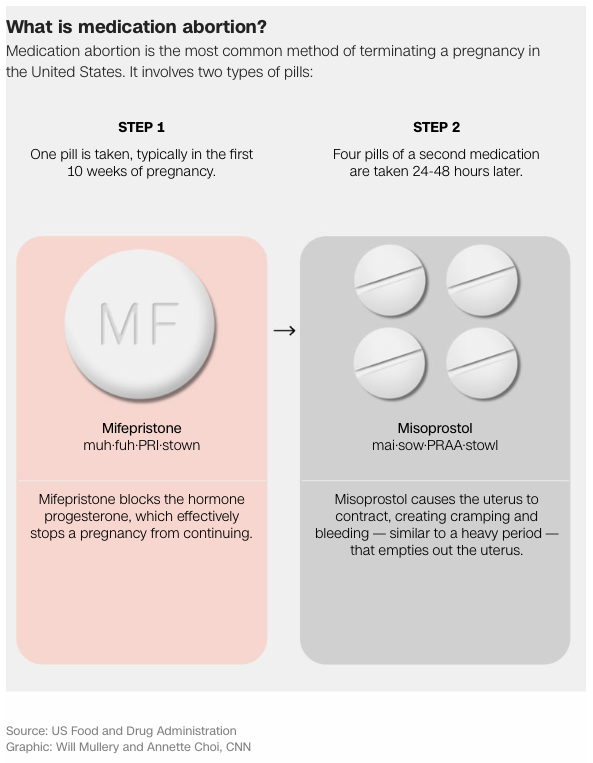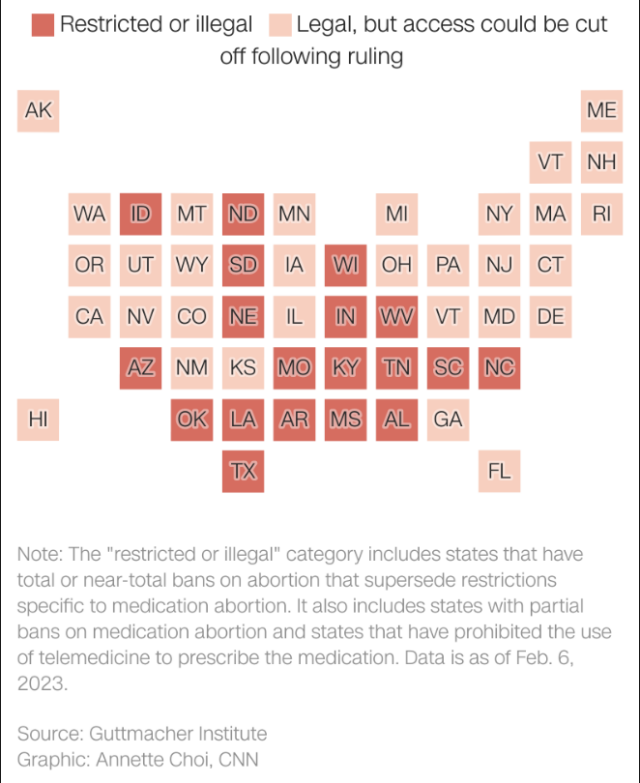By Caitlyn Meisner | Copy Editor
A federal judge in Texas held a hearing Wednesday in Amarillo on the lawfulness of the Food and Drug Administration’s approval process of an abortion pill drug in 2000.
Judge Matthew J. Kacsmaryk, a Trump-appointed federal judge, was assigned to the case and resides over the northern district of Texas. He said he would issue a decision and opinion “as soon as possible.”
CNN reported Kacsmaryk announced the hearing wouldn’t be held until late Tuesday evening due to the multitude of death threats and harassment the courthouse received.
What happened at the hearing?
CNN reported Kacsmaryk indicated he was considering scenarios where the drug approval can remain in tact, but blocking the FDA’s recent moves to make the pills easier to obtain.
CNN also reported that Kacsmaryk seemed to sympathize with Alliance of Hippocratic Medicine (AHM), who said the approval of the drug in 2000 was unlawful. CNN said he was skeptical of AHM’s “aggressive” request to withdraw the pill from shelves.
What is the abortion pill?
Abortion via pill is more commonly known as a medication abortion. If choosing this avenue, there are two medications taken to end the pregnancy: mifepristone and misoprostol.
Mifepristone is the first pill taken and the subject of the lawsuit. The medication blocks the female’s ability to produce progesterone, the main hormone needed to continue pregnancy.
Misoprostol, the second pill, is FDA-approved to prevent stomach ulcers and is used with medication abortions. This pill is taken between six and 48 hours after ingesting mifepristone to increase the chances of a successful abortion.
The FDA has approved mifepristone to be taken through 10 weeks of pregnancy.

What are the arguments in the lawsuit?
The organization filing against the FDA is the AHM. Their values, as stated on their website, say while they are not medical professionals, they have an interest in ensuring that human dignity and respect for human life is upheld in the practice of medicine.
AHM filed this lawsuit in November 2022 and are asking the courts to pull these early pregnancy abortion pills off the shelves because the FDA did not adequately review the drug in 2000, and is contrary to their main purpose of ensuring drug safety.
The FDA is asking for the judge to keep this pill on the shelf since they underwent a proper review process and the filing is past the statute of limitations, the maximum time after an event that legal proceedings can be made.
For example, the statute of limitations on a felony is typically for five years, so the federal government cannot file criminal charges once five years have passed.
Who is the judge?
Judge Kacsmaryk is a federal judge appointed by former President Donald Trump in 2019. He will soon rule on the abortion pill and could temporarily halt over half the legal abortions in the United States.
He has not made his decision yet. Kacsmaryk has only held a hearing and has heard arguments from both AHM and FDA. He said his decision and written opinion will come “as soon as possible.”
Pat Souter, adjunct professor in healthcare studies at the Baylor school of law, said he doesn’t see Kacsmaryk “going half-way” on this decision.
He also said the decision made by Kacsmaryk not only applies to Texas, but all 50 states. Since he is a federal judge, his ruling will impact every state, even states where abortion remains accessible.
What happens if the judge rules to block access to the abortion pill?
If Judge Kacsmaryk rules to block access and rules in favor of AHM, this method of abortion will become virtually inaccessible. This ruling applies to the entire United States, including where abortion is legal in California, New York and the New England region.
This means that more than half of the abortions in the U.S. would be in jeopardy. The Guttmacher Institute reported that 54% of the abortions in the United States are done via medication abortion.

If this were to happen, it is likely that abortion-rights activists will seek to appeal the Kacsmaryk’s decision in an appellate court.
What happens if the judge rules to allow the abortion pill?
If Judge Kacsmaryk rules to keep the abortion pill on the shelves, it is likely anti-abortion activists and the plaintiffs in this case will seek to appeal the judge’s decision in an appellate court.
What do Baylor students think?
Rockwall senior David Folks said he doesn’t agree with these drugs being available at pharmacies or mailed across the country.
“Having this unsupervised and dispensable through Walgreens and CVS is just absolutely abysmal largely because of the health risks to women,” Folks said.
Some of the side effects of taking these two medications include abdominal pain or uterine cramping, diarrhea, dizziness and nausea. Less common side effects are excessively heavy vaginal bleeding or unusual fatigue.
“We should care for the people that are deceived who take these drugs because they are putting themselves in harm’s reach through doing this,” Folks said. “We should not approve something that is dangerous … and something that takes another life.”
Caroline Carney, San Antonio junior and president of Bears for Life, said she cares about women and is concerned women are receiving this pill without having an ultrasound or the potential for sepsis, a life-threatening response to an infection.
She also said she’s concerned women make quick decisions about getting an abortion due to the accessibility of the medications.
“When you can access something a bit easier and quicker, it seems quite casual,” Carney said. “There’s always the fear that someone may make a decision a bit quicker than they thought about it.”
Folks and Carney said they stress the importance of the abortion pill reversal, which provides additional progesterone to combat the mifepristone.
The reversal pill is controversial and a consensus has not been reached by doctors. An observational study was published by the National Library of Medicine that declared the 64-68% effective drug safe. The American Congress of Obstetricians and Gynecologists said reversal treatments are not based on science and do not meet clinical standards.
Kansas City, Kan., senior Chinmay Dabli said he does not believe banning abortions will stop the practice.
“There are not many alternatives to abortion, and it’s unavoidable,” Dabli said. “Restricting abortions puts more women at risk because [abortions] will not stop, they will become less safe. There are scientifically tested and medically approved [avenues] for abortion that have been proven to be safe.”
The FDA has conducted studies on the safety of mifepristone and it found there are less deaths per million users than Viagra and penicillin.

Studies have also been conducted to test the safety of medication abortions compared to childbirth and procedural abortions, and it was found that medication abortions have a 0.31% risk of complications, while childbirth and procedural abortions have risk rates of 1.3% and 0.41%, respectively.
Plano junior Emily Kolb said medication abortions can provide pregnant people with a last minute option and illegal means of aborting a pregnancy might be more dangerous than the pill.
“This is likely the only option before seeking illegal means of abortion,” Kolb said. “If Texas is willing to take all options away, they need to at least allow one option … because carrying a pregnancy can be traumatic.”
According to the World Health Organization, around 30 women die for every 100,000 unsafe abortions and is a leading case of maternal death around the globe.
What happens next?
A decision from Judge Kacsmaryk is pending and is expected to come at a later date.





